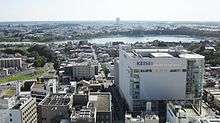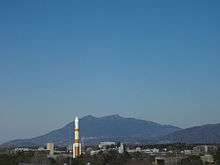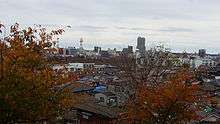Ibaraki Prefecture
| Ibaraki Prefecture 茨城県 | ||
|---|---|---|
| Prefecture | ||
| Japanese transcription(s) | ||
| • Japanese | 茨城県 | |
| • Rōmaji | Ibaraki-ken | |
| ||
 | ||
| Country | Japan | |
| Region | Kantō | |
| Island | Honshu | |
| Capital | Mito | |
| Government | ||
| • Governor | Masaru Hashimoto | |
| Area | ||
| • Total | 6,095.58 km2 (2,353.52 sq mi) | |
| Area rank | 23rd | |
| Population (September 1, 2010) | ||
| • Total | 2,964,141 | |
| • Rank | 11th | |
| • Density | 486.28/km2 (1,259.5/sq mi) | |
| ISO 3166 code | JP-08 | |
| Districts | 7 | |
| Municipalities | 44 | |
| Flower | Rose (Rosa) | |
| Tree | Ume tree (Prunus mume) | |
| Bird | Eurasian Skylark (Alauda arvensis) | |
| Website |
www | |
Ibaraki Prefecture (茨城県 Ibaraki-ken) is a prefecture of Japan, located in the Kantō region on the main island of Honshu.[1] The capital is Mito.[2]
History
Ibaraki Prefecture was previously known as Hitachi Province. In 1871, the name of the province became Ibaraki.
Geography





Ibaraki Prefecture is the northeastern part of the Kantō region, stretching between Tochigi Prefecture and the Pacific Ocean and bounded on the north and south by Fukushima Prefecture and Chiba Prefecture. It also has a border on the southwest with Saitama Prefecture. The northernmost part of the prefecture is mountainous, but most of the prefecture is a flat plain with many lakes.
As of April 1, 2012, 15% of the total land area of the prefecture was designated as Natural Parks, namely Suigo-Tsukuba Quasi-National Park and nine Prefectural Natural Parks.[3]
Cities
Thirty-two cities are located in Ibaraki Prefecture:
- Bandō
- Chikusei
- Hitachi
- Hitachinaka
- Hitachiōmiya
- Hitachiōta
- Hokota
- Inashiki
- Ishioka
- Itako
- Jōsō
- Kamisu
- Kasama
- Kashima
- Kasumigaura
- Kitaibaraki
- Koga
- Mito (capital)
- Moriya
- Naka
- Namegata
- Omitama
- Ryūgasaki
- Sakuragawa
- Shimotsuma
- Takahagi
- Toride
- Tsuchiura
- Tsukuba
- Tsukubamirai
- Ushiku
- Yūki
Towns and villages
These are the towns and villages in each district:
- Higashiibaraki District
- Inashiki District
- Kitasōma District
- Kuji District
- Naka District
- Sashima District
- Yūki District
Mergers
Economy
Ibaraki's industries include energy, particularly nuclear energy, production, as well as chemical and precision machining industries. The Hitachi company was founded in the Ibaraki city of the same name.
As of March 2011, the prefecture produced 25% of Japan's bell peppers and Chinese cabbage.[5]
Demographics
Ibaraki's population is increasing modestly as the Greater Tōkyō region spreads out.
Culture
Ibaraki is known for nattō, or fermented soybeans, in Mito, watermelons in Kyōwa (recently merged into Chikusei), and chestnuts in the Nishiibaraki region.
Ibaraki is famous for the martial art of Aikidō founded by Ueshiba Morihei, also known as Osensei. Ueshiba spent the latter part of his life in the town of Iwama, now part of Kasama, and the Aiki Shrine and dojo he created still remain.
There are castle ruins in many cities, including Mito, Kasama, and Yūki.
Kasama is famous for Shinto, art culture and pottery.
The capital Mito is home to Kairakuen, one of Japan's three most celebrated gardens, and famous for its over 3,000 Japanese plum trees of over 100 varieties.
Education
University
- Ami
- Hitachi
- Mito
- Ibaraki University
- Tokiwa University
- Tsuchiura
- Tsukuba International University
- Tsukuba
- Ryugasaki
Sports
The sports teams listed below are based in Ibaraki.
Football (soccer)
Volleyball
Rugby
- Kashima Rugby Football Club RFC
Baseball
- Ibaraki Golden Golds (Regional club)
Puroresu
- Hitachi Pro Wrestling (Regional group)
Tourism
Transportation and access
Railways
- East Japan Railway Company
- Tsukuba Express
- Kanto Railway
- Kashima Rinkai Railway Ōarai Kashima Line
- Hitachinaka Seaside Railway Minato Line (Katsuta-Ajigaura)
- Mooka Railway Mooka Line
Cable cars
Roads
Expressways
National Highways
- Route 4 (around Koga area)
- Route 6 (Nihonbashi of Tokyo-Toride-Tsuchiura-Mito-Hitachi-Iwaki-Sendai)
- Route 50
- Route 51 (Mito-Kashima-Itako-Narita-Chiba)
- Route 118
- Route 123
- Route 124
- Route 125 (Katori-Tsuchiura-Tsukuba-Koga-Gyoda-Kumagaya)
- Route 245
- Route 253
- Route 294
- Route 349
- Route 354
- Route 355
- Route 400 (Mito-Nakagawa-Nikko-South Aizu-West Aizu
- Route 408
- Route 461
Ports
- Hitachi Port
- Hitachinaka Port
- Oarai Port - Ferry route to Tomakomai, Muroran of Hokkaido
- Kashima Port
Airports
Pronunciation
The prefecture is often mispronounced "Ibaragi". However, the correct pronunciation is "Ibaraki". According to the author of "Not Ibaragi, Ibaraki",[6] this is most likely due to a mishearing of the softening of the "k" sound in Ibaraki dialect.
Notes
- ↑ Nussbaum, Louis-Frédéric. (2005). "Ibaraki-ken" in Japan Encyclopedia, p. 367, at Google Books; "Kantō" in Japan Encyclopedia, p. 479, at Google Books.
- ↑ Nussbaum, "Mito" at Japan Encyclopedia, p. 642, at Google Books.
- ↑ "General overview of area figures for Natural Parks by prefecture" (PDF). Ministry of the Environment. 1 April 2012. Retrieved 9 November 2013.
- ↑ Nussbaum, "Ibaraki" at Japan Encyclopedia, p. 367, at Google Books.
- ↑ Schreiber, Mark, "Japan's food crisis goes beyond recent panic buying", The Japan Times, 17 April 2011, p. 9.
- ↑ いばらぎじゃなくていばらき [Ibaragi ja Nakute Ibaraki]
References
- Nussbaum, Louis-Frédéric and Käthe Roth. (2005). Japan Encyclopedia. Cambridge: Harvard University Press. ISBN 978-0-674-01753-5. OCLC 58053128.
External links
| Wikimedia Commons has media related to Ibaraki Prefecture. |
- Official Ibaraki Prefecture homepage
- The E-Ibaraki Report: articles and commentary of foreigners living in Ibaraki, produced by the International Affairs Division, Ibaraki Prefecture
- Ibaraki Japan
| ||||||||||||||||||||||||||||||||||||
| ||||||||||||||||||||||||||||||||||||||||||
Coordinates: 36°14′N 140°17′E / 36.233°N 140.283°E
|

